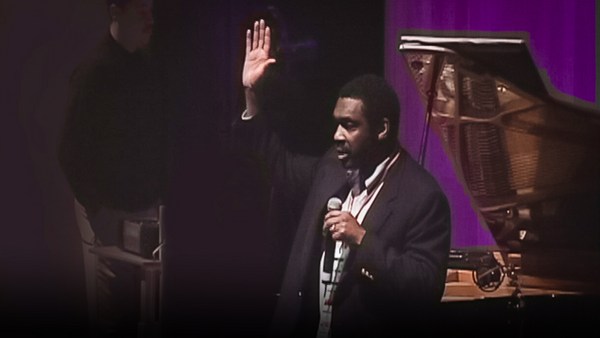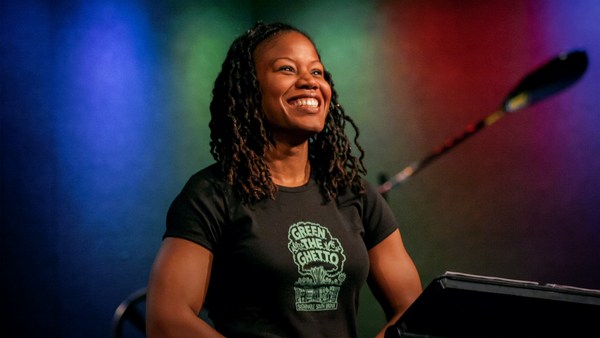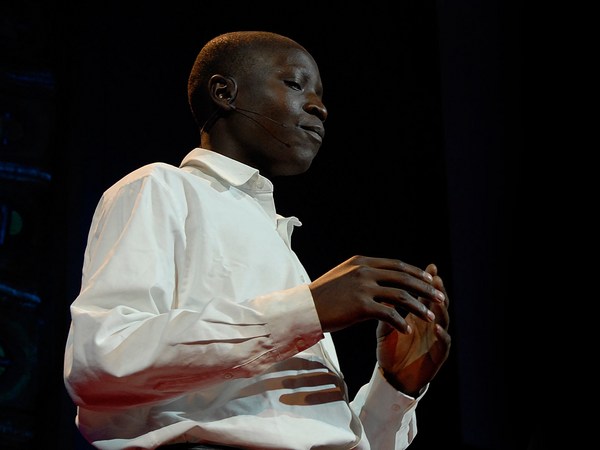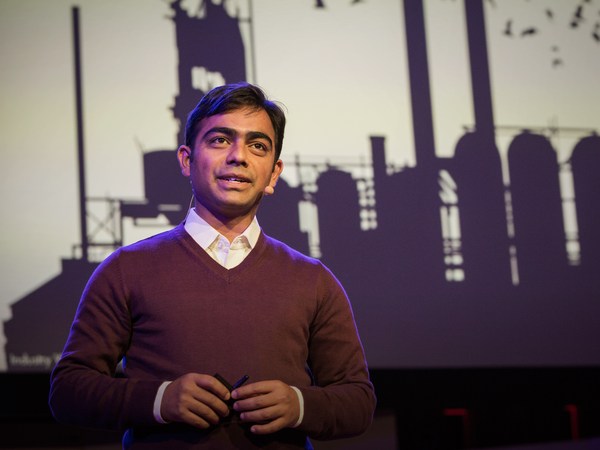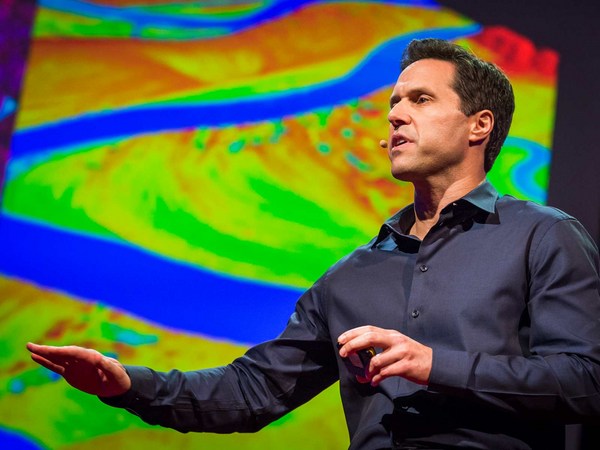I don't speak English. I start speaking English, learning English, about a year ago. I speak French and I grew up with French, so my English is Franglais. I'm born in the Western Congo, in an area around here, and then went to university in Kisangani. And after I finished, I went to this area, the Ituri Forest. But what I've been doing -- when I was about 14, I grew in my uncle's house. And my father was a soldier, and my uncle was a fisherman and also a poacher. What I've been doing from 14 to 17 was, I was assisting them collecting ivory tusk, meat and whatever they were killing, poaching, hunting in the forest, bring it in the main city to get access to the market.
But finally, I got myself involved. Around 17 to 20 years, I became, myself, a poacher. And I wanted to do it, because -- I believed -- to continue my studies. I wanted to go to university, but my father was poor, my uncle even. So, I did it. And for three to four years, I went to university. For three times, I applied to biomedical science, to be a doctor. I didn't succeed. I was having my inscriptions, my admission to biology. And I said, "No way, I'm not doing it. My family's poor, my area don't have better health care. I want to be a doctor to serve them." Three times, that means three years, and I start getting old. I say, "Oh, no, I continue." So, I did tropical ecology and plant botany. When I finished, I went to the Ituri Forest for my internship. It's where I really getting passion with what I'm doing right up to now -- I'm standing in front of you -- doing botany and wildlife conservation.
That time the Ituri Forest was created as a forest reserve with some animals and also plants. And the training center there was built around the scientific Congolese staff and some American scientists also. So, the Okapi Faunal Reserve protects number -- I think that is the largest number of elephants we have right now in protected areas in Congo. It has also chimpanzees. And it has been named Okapi Faunal Reserve because of this beautiful creature. That is a forest giraffe. I think you guys know it quite well. Here we have savanna giraffes, but through evolution we have this forest giraffe that lives only in Congo. It has also some beautiful primates. Thirteen species -- highest diversity we can find in one single area in Africa. And it has the Ituri Forest itself -- about 1,300 species of plants, so far known.
I joined the Wildlife Conservation Society, working there, in 1995, but I started working with them as a student in 1991. I was appointed as a teaching assistant at my university because I accomplished with honor. But I didn't like the way -- the instruction I got was very poor. And I wanted to be formed to a training center and a research center. With the end of the dictatorship regime of Mobutu Sese Seko, that most of you know, life became very, very difficult. And the work we have been doing was completely difficult to do and to achieve it.
When Kabila started his movement to liberate Congo, so Mobutu soldiers started moving and retreated. So they started fleeing from the east to the west. And the Okapi Faunal Reserve is there, so there was a road from Goma, somewhere here, and coming like this. So they might go through, pass through the Okapi Faunal Reserve. Congo has five of the world's richest sites of protected area, and the Okapi Faunal Reserve is one of them. So soldier was fleeing in the Okapi Faunal Reserve. On their way, they looted everything. Torture, wars -- oh, my God, you can't believe. Every person was looking his way -- where to go, we don't know. And it was for us, the young, the first time really we hear the language of war, of guns. And even people who faced the rebellion of 1963, after our independence, they didn't believe what was happening. They were killing people. They were doing whatever they want because they have power. Who have been doing that? Young children. Child soldiers. You can't ask him how old he is because he has guns.
But I was from the west, working in the east. I even [at] that time was not speaking Swahili. And when they came, they looted everything. You can't speak Lingala because Lingala was from Mobutu, and everyone speaking Lingala is soldier. And I was from the same area to him. All my friends said, we are leaving because we are a target. But I'm not going to the east, because I don't know Swahili. I stay. If I go, I will be killed. I can't go back to my area -- it's more than 1,000 kilometers [away].
I stayed after they looted everything. We have been doing research on botany, and we have a small herbarium of 4,500 sheets of plants. We cut, we dry and we packed them, we mounted them on a folder. Purpose: so that we start them for agriculture, for medicine, for whatever, and for science, for the study of the flora and the change of the forest. That is people moving around, that's even Pygmies. And this is a bright guy, hard-working person, and Pygmy. I've been working with him about 10 years. And with soldiers, they went to the forest for poaching elephants. Because he's Pygmy, he knows how to track elephants in the forest. He has been attacked by a leopard and they abandon him in the forest. They came to told me, I have to save him. And what I did, I gave him just antibiotics that we care for tuberculosis. And fortunately, I saved his life.
And that was the language of the war. Everywhere there has been constant extraction of mineral, killing animals, the logging timbers and so on. And what of important things -- I think all of you here have a cell phone. That mineral has killed a lot: five millions of Congolese have gone because of this Colombo-Tantalite -- they call it Coltan -- that they use it to make cell phones and it has been in that area, all over in Congo. Extraction, and good, big business of the war.
And what I did for the first war, after we have lost everything, I have to save something, even myself, my life and life of the staff. I buried some of our new vehicle engines, I buried it to save it. And some of equipment went with them, on the top of the canopy, to save it. He's not collecting plants, he's going to save our equipment on the canopy. And with the material that's left -- because they wanted to destroy it, to burn it, they didn't understand it, they didn't go to school -- I packed it. And that is me, going to, hurrying to Uganda, to try to save that 4,000 material, with people carrying them on the bikes, bicycles. And after that, we succeeded. I housed that 4,000 material at the herbarium of Makerere University. And after the war, I have been able to bring it back home, so that we continue our studies.
The second war came while we didn't expect it. With friends, we had been sitting and watching match football, and having some good music with WorldSpace radio, when it started, I think. So, it was so bad. We heard that now from the east again the war started, and it's going fast. This time I think Kabila will go in place of, as he did with Mobutu. And the reserve was a target to the rebels. Three different movements and two militia acting in the same area and competing for natural resources. And there was no way to work. They destroy everything. Poaching -- oh, no way. And that's the powerful men. We have to meet and to talk to them. What's the regulation of the reserve and what is the regulation of the parks? And they can't do what they are doing. So we went to meet them. That is Coltan extraction, gold mining.
So, we started talking with them, convincing them that we are in a protected area. There are regulations that it's prohibited to do logging, mining and poaching, specifically. But they said, "You guys, you think that soldiers who are dying are not important, and your animals you are protecting are most important. We don't think so. We have to do it, because to let our movement advance." I say, "No way, you are not going to do it here." We started talking with them and I was negotiating. Tried to protect our equipment, tried to protect our staff and the villages of about 1,500 people. And we continued.
But I was doing that, negotiating with them. Sometimes we are having meeting and they are talking with Jean-Pierre Bemba, with Mbusa Nyamwisi, with Kabila, and I'm there. Sometimes, they talk to my own language, that is, Lingala. I hear it and what strategy they are doing, what they are planning. Sometimes, they are having a helicopter to supply them with ammunition and so on. They used me to carry that, and I was doing counting, what comes from where, and where, and where. I had only this equipment -- my satellite phone, my computer and a plastic solar panel -- that I hide it in the forest. And every time, daily, after we have meeting, what compromise we have, whatever, I go, I write a short email, send it. I don't know how many people I had on my address. I sent the message: what is going about the progress of the war and what they are planning to do. They started suspecting that what we do on the morning, and the afternoon, it's on the news, BBC, RFI. (Laughter) Something might be going on. And one day, we went for a meeting. (Applause) Sorry.
One day, we went to meet the Chief Commander. He had the same iridium cell phone like me. And he asked me, "Do you know how to use this?" I said, "I have never seen it. (Laughter) I don't know." And I had mine on my pocket. So, it was a chance that they trusted me a lot. They didn't -- they was not looking on me. So I was scared. And when we finished the meeting, I went to return it in the forest. And I was sending news, doing whatever, reporting daily to the U.N., to UNESCO, to our institution in New York, what have been going. And for that, they have been having big pressure to leave, to free the area. Because there was no way -- whatever they do, it's known the same time.
During the first two rebellions, they killed all animals in the zoo. We have a zoo of 14 Okapis, and one of them was pregnant. And during the war, after a week of heavy war, fighting in the area, we succeeded: we had the first Okapi. This is the only trouser and shirt remind me of this. This is not local population, this is rebels. They are now happy sending the news that they have protected the Okapi with the war, because we sent the news that they are killing and poaching everywhere. After a week, we celebrated the birthday of that Okapi, they killed an elephant, just 50 meters to the area where the zoo, where Okapi was born. And I was mad. I oppose it -- that they are now going to dissect it, until I do my report and then I see the Chief Commander. And I succeeded. The elephant just decayed and they just got the tusks.
What we are doing after that -- that was the situation of the war -- we have to rebuild. I had some money. I was paid 150 dollars. I devoted half of it to rebuild the herbarium, because we didn't have good infrastructure to start plants. Wildlife Conservation Society more dealing with plants. I started this with 70 dollars, and start fundraising money to where I've been going. I had opportunity to go all over, where herbarium for my African material is. And they supported me a bit, and I built this. Now, it's doing work to train young Congolese.
And also, what one of the speciality we are doing, my design is tracking the global warming effect on biodiversity, and what the impacts of the Ituri Forest is playing to uptake carbon. This is one of the studies we are doing on a 40-hectare plot, where we have tagged trees and lianas from one centimeters, and we are tracking them. We have now data of about 15 years, to see how that forest is contributing to the carbon reductions. And that is -- I think it's difficult for me. This is a very embarrassing talk, I know. I don't know where to start, where to finish it.
When I was thinking to come here, what best title I wanted to say to my talk, I didn't find this. But now I think that I would have titled it, "The Language of Guns." Where are you people? Now we are talking about reconstitution, rebuild Africa. But is gun industries a tool to rebuild, or is it a game? I think we see the war like a game -- like soccer, football. Everybody is happy, but see what it's doing, see what is going in Darfur. Now we say, oh, my God. See what the wars in Rwanda. That's because of the language of guns. I don't think that someone may blame Google, because it's doing the right things, even if people like Al-Qaeda are using Google to connect between them. But it's serving millions for the best. But what is doing with gun industries? Thank you. (Applause)
Chris Anderson: Thank you, thank you. Just wait over there. It's an amazing story. I suspect a lot of people here have the same question I have. How can we help you?
Corneille Ewango: That's really embarrassing questions. I think that now I feel nervous. And I think, helping us, people are acting sometimes by ignorance. I did it myself. If I know when I was young, that [by] killing an elephant, I'm destroying biodiversity, I would not have done it. Many, many of you have seen the talents of Africans, but there are few who are going to school. Many are dying because of all those kind of pandemics, HIV, malaria, poverty, not going to school. What you can assist us, it's by building capacities. How many have got opportunity like me to go to U.S., do a master's? And go -- now, I'm in the Netherlands to do a Ph.D. But many of them are just here, because they don't have money. And they can't go even to university. They can't even attain the bachelor's degree. Building capacities for the young generation is going to make a better generation and a better future tomorrow for Africa.
CA: Thank you, thank you. (Applause)
